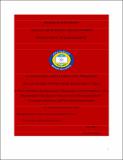| dc.description.abstract | The study has attempted to assess the role of Local Governance in Rural Land Conflict Management in relation to Transparency and Accountability. The general objective of this study is to assess and understand the role and contribution of the local land governance structures and institutions to the management of the diverse rural land conflicts. Both qualitative and quantitative approaches were used for the study by making one supplementing the other. The study assessed the role of local governance in rural land conflict management by using 136 households who had experienced conflicts in the last two years. Four Kebeles with high prevalence of rural land conflicts were purposively selected from the total of 20 Kebeles of Ganta Afeshum wereda. Moreover, focus group discussion and interview were also employed to collect the qualitative data. It was found that most of the land cases are managed formally even though the preference of the litigants was the informal or the customary one as it reduces time and money, maintains the relationship of litigants, and it is believed by the rural community that the customary one is a win-win to both litigants. It is also an important means of consensus building approach. The study also showed that unclear land provision scheme is the main sources of conflicts. Boundary conflict is found as the main type which is occurred frequently. Transparency and accountability are used to measure the local land governance as indicators, and it was found that both indicators are at their minimal level. Land Governance structures and institutions at local level are not supportive enough to the rural community in terms of reaching the poor and the marginalized group. The governance structure was found weak, non-participative, biased to the rich and not inclusive as the individuals working with in the structure are incapable, inexperienced and corrupted ones. Gap in enforcement of land laws, unclear land provision schemes by the government, unclear land entitlement procedures, and low coverage of the land governance structures and institutions are the major challenges of the local land governance that possibly could result in rural land conflicts. Hence, to minimize problems related to land governance the structures and institutions should increase their coverage besides to equipping it with educated, capable, experienced and motivated manpower through providing trainings and other motivating factors like allowances, salary increments, recognition etc. This might enhance the transparency and accountability of these institutions. Customary way of conflict management should be considered in the legal conflict management systems to easily manage conflicts before cases are filed in the legal system. This reduces time, money and other resource to the community with a significant level. Hence, the livelihood of the rural community will be enhanced to a better level. | en_GB |


